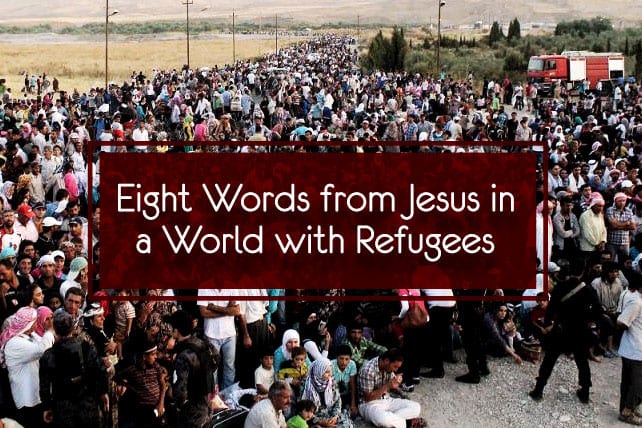I lived in Syria. I grieve over the destruction and death that occurs there every day. Since 2012, I’ve been living in a neighboring country, seeking to bring hope to Syrian refugees. We help them with practical needs like blankets, heaters, food boxes and diapers.
Daily I’m confronted with the overwhelming needs that we simply cannot meet. Many people I know are waiting to travel to the West or already have. They are hoping for a better future.
Jesus calls us to follow him. Sometimes it is clear how we do this, and often it is not. In trying to grapple with what it means to follow Jesus as it relates to the current refugee crisis, it is worth rehearsing at least eight things Jesus expects from those who follow him. May he give us all wisdom in how best to apply them.
1. “Love God, and therefore love the things he loves.”
“You shall love the Lord your God with all your heart and with all your soul and with all your mind. This is the great and first commandment” (Matthew 22:37–38 tells us that God “executes justice for the fatherless and the widow, and loves the sojourner, giving him food and clothing.”
It is no surprise, then, that the very next verse is, “Love the sojourner, therefore, for you were sojourners in the land of Egypt” (Deuteronomy 10:19).
2. “Love your neighbors, as you love yourselves.”
“You shall love your neighbor as yourself” (Matthew 22:39. He responded with the story of the Good Samaritan and taught us that our neighbor is anyone who is in need, even our enemies (as Jews and Samaritans were).
3. “Do for others what you want them to do for you.”
“Whatever you wish that others would do to you, do also to them, for this is the Law and the Prophets” (Matthew 7:12). Jesus doesn’t say we should do some things for others that we’d like done for us. He says, “Whatever you wish that others would do to you.” If there is anything that you would want others to do for you, you ought to do it for them.
If you were a refugee, fleeing war, would you want another country to give you safe refuge?
4. “Do not expect (or demand) greater security, comfort or treatment than I had.”
“A scribe came up and said to him, ‘Teacher, I will follow you wherever you go.’ And Jesus said to him, ‘Foxes have holes, and birds of the air have nests, but the Son of Man has nowhere to lay his head’” (Matt 8.19–20″>Matthew 8:19–20).
“A disciple is not above his teacher, nor a servant above his master. It is enough for the disciple to be like his teacher, and the servant like his master. If they have called the master of the house Beelzebul, how much more will they malign those of his household” (Matt 10.24–25″>Matthew 10:24–25).
5. “Do not fear.”
Immediately after Jesus tells us to not expect better treatment than he got, he calls us to not fear. “So have no fear of them. … And do not fear those who kill the body but cannot kill the soul. Rather fear him who can destroy both soul and body in hell” (Matt 10.26–28″>Matthew 10:26–28).












